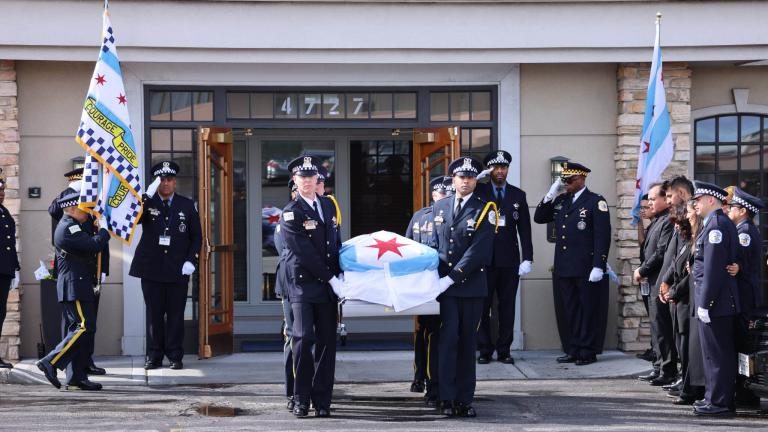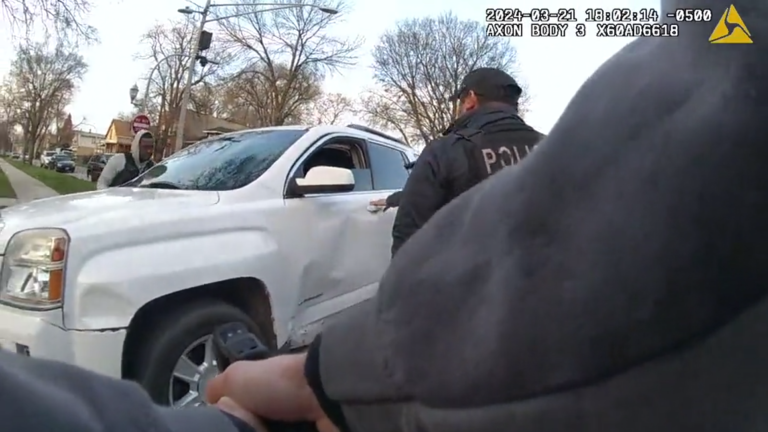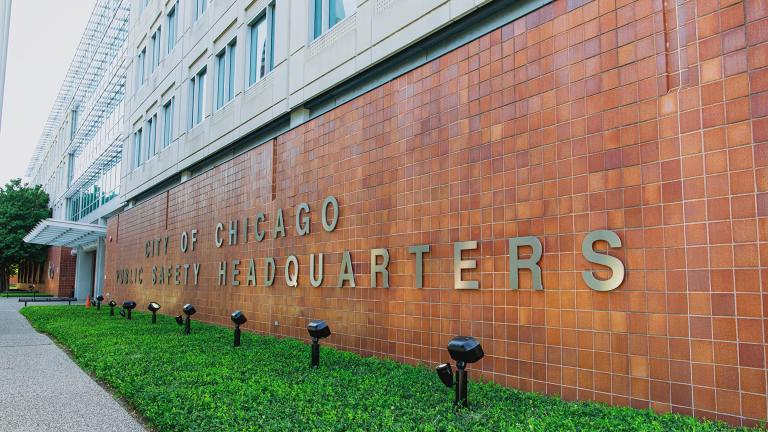Chicago police continued to target Black and Latino drivers with a massive campaign of traffic stops that failed to make the city safer in 2023, despite promises from Supt. Larry Snelling to focus on dangerous drivers and criminal activity, according to a new report from a coalition of groups.
The vast majority of the more than 537,000 traffic stops made by Chicago police in 2023 were based on dubious evidence of minor violations that took direct aim at Black and Latino Chicagoans but spared White Chicagoans, according to a new report from Impact for Equity, a nonprofit advocacy and research organization that has helped lead the push to reform the Chicago Police Department.
“There is clear evidence that there is discrimination happening here and it needs to be addressed,” said Amy Thompson, staff counsel for Impact for Equity’s criminal legal system division.
Since 2015, Black Chicagoans were six times more likely to be stopped by police while driving than White Chicagoans. Latino drivers were twice more likely to be stopped than White drivers, according to the report.
A spokesperson for the Chicago Police Department told WTTW News in a statement that traffic stops are “not conducted based on race or any other protected class” and all officers must undergo training designed to combat implicit bias.
“Fair and constitutional policing is the foundation of the Chicago Police Department’s efforts to strengthen public safety and trust across the city,” the CPD statement said. “Officers only conduct traffic stops when they have probable cause or reasonable articulable suspicion that a crime, including but not limited to traffic violations, has been committed, is being committed or is about to be committed.”
The number of traffic stops rose 5% in 2023, as compared with 2022, according to the report, which is based on information obtained from the Chicago Police Department through the Freedom of Information Act by Impact for Equity.
That increase comes on top of a 35% increase in the number of traffic stops between 2021 and 2022, according to the Impact for Equity report.
More than 51% of all drivers stopped by police officers in 2023 were Black, and nearly 31% of drivers pulled over by Chicago police officers were Latino. By comparison, just 13.6% of drivers stopped by Chicago police were White, according to the report.
The population of Chicago is 31.4% White, 29.9% Latino, 28.7% Black and 6.9% Asian, according to the 2020 U.S. census.
Approximately 20% of all traffic stops occurred in two West Side police districts that are home to less than 7% of the city’s population, according to the report. More than 96% of the people who live in those neighborhoods are Black, and face some of the highest crime rates, according to the report.
That is an indication that many of these stops are being used as a pretext by officers investigating something else, Thompson said.
Approximately 73% of the traffic stops made by Chicago police officers in 2023 were prompted by improper license registration or a broken headlight, taillight or license plate light. Just 27.4% of all stops were prompted by a moving violation, including speeding and failure to stop at stop signs, according to the report.
Just 2.2% of those stops led to an arrest, and a gun was recovered in just 0.5% of stops, according to the report. Approximately 4.4% of stops led to a citation, according to the report.
“These stops are a waste of time and a waste of money,” Thompson said. “They do not make us safer.”
Not only do the stops not prevent crime or allow officers to get lawbreakers off the street, but they also make it impossible for city leaders to make good on promises to restore the public’s trust in the beleaguered Police Department, which has faced decades of scandals, misconduct and brutality, Thompson said.
A separate report from Chicago’s inspector general released in March 2022 found that when a police stop results in an officer using force against a Chicagoan, 83.4% of those incidents involve a Black person.
The report included the first three months under the leadership of Chicago Police Supt. Larry Snelling, who vowed to focus the department’s traffic enforcement strategy to narrow in on dangerous drivers and those suspected of committing crimes like robberies, shootings or carjackings.
But there was little change to the way Chicago police officers stopped drivers after he took office in late September, according to the report. Officers made nearly 118,900 traffic stops in October, November and December – more than in all of 2015, according to the report.
“We were disappointed but not surprised,” Thompson said. “Traffic stops are really the bread and butter of CPD’s investigative strategy.”
Impact for Equity has called for the Chicago Police Department to ban stops designed to find evidence of other crimes. A similar policy is in place in Los Angeles, where the crime rate is significantly lower than in Chicago.
CPD should also prohibit officers from pulling over drivers because of improper registration issues or broken equipment, like a single nonfunctioning taillight, according to Impact for Equity. Similar bans are in place in San Francisco and Philadelphia.
In addition, Chicago police should be required to have an independent legal basis before requesting a driver’s consent to search their car, according to Impact for Equity.
The nonprofit advocacy and research organization will urge the Community Commission for Public Safety and Accountability to adopt that policy and order the police department to change the way it uses traffic stops.
“This needs to change and this needs to change now,” Thompson said. “There is no reason for this practice to continue.”
The number of traffic stops conducted by Chicago police officers began to surge in 2015, when officers made less than 100,000 stops. After department officials agreed to curtail the use of stop-and-frisk as part of an agreement with the American Civil Liberties Union of Illinois after the civil rights organization found officers stopped Black Chicagoans at a far higher rate than Latino or White Chicagoans.
The team overseeing court-ordered reforms of the Chicago Police Department found in a report released in June said there was evidence to suggest a direct correlation between a significant increase in the rate of reported traffic stops by police officers as the number of pedestrian stops dropped.
The ACLU of Illinois sued the city in June, alleged the use of traffic stops by the CPD was the latest chapter of the city’s “long and sordid history” of racist discrimination. That suit, which seeks to be certified as a class action covering millions of Chicago, is pending, court records show.
A Safer City is supported, in part, by the Sue Ling Gin Foundation Initiative for Reducing Violence in Chicago.
Contact Heather Cherone: @HeatherCherone | (773) 569-1863 | [email protected]








